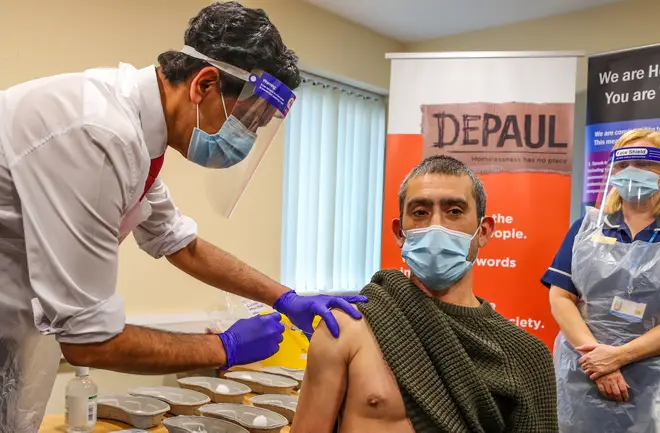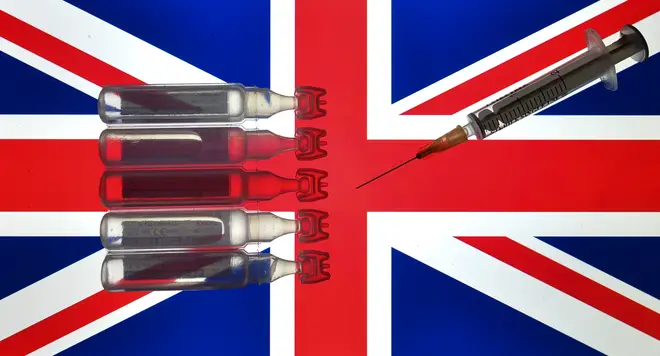
Clare Foges 6pm - 9pm
7 April 2021, 14:49

The UK has approved three coronavirus vaccines and placed orders for several other jabs. Here, LBC takes a look at the difference between the AstraZeneca, Pfizer and Moderna drugs, and compares them.
In the UK, the AstraZeneca and Pfizer coronavirus jabs have been used in the vaccine rollout, with the Moderna vaccine just being administered in Wales - but there are key differences between all the Covid vaccines, particularly when it comes to the new variants.
Most recently, when comparing the Covid-19 vaccines, including whether the Pfizer vaccine is better than the Oxford and which one is more effective, it's been confirmed the AstraZeneca jab is less effective against the new South African variant - so what other vaccine comparisons should we know about?
Related article: AstraZeneca vaccine and blood clots: What's the evidence?
Related article: Moderna vaccine: Everything you need to know
Here, LBC explains the differences between the Covid vaccines available in the UK, including how they will be given, how many doses each drug requires and the number of orders the UK has placed for each vaccine. Here's you full Covid-19 vaccine comparison:

Pfizer, Moderna and AstraZeneca: The Coronavirus Vaccines Explained
Oxford-AstraZeneca: The AstraZeneca vaccine has proven to be 90 per cent effective if administered in a half dose followed by a full dose, or 62 per cent effective if given in two full doses. However, a new study at the University of Oxford has found the efficacy from two standard doses of the vaccine administered three months apart to be 82.4 per cent.
Pfizer-BioNTech: Pfizer's vaccine is 52 per cent effective after the first dose, but 95 per cent after the second dose. However, the Joint Committee on Vaccination and Immunisation (JCVI) suggests the first dose can be up to between 89 and 92 per cent effective.
Moderna: Clinical trials for the Moderna vaccine show it is 94.1 per cent effective and even 100 per cent in preventing severe coronavirus symptoms, as well as working across all age groups.
Novavax: The Novavax vaccine is said to have been 89.3 per cent effective in trials. It is also believed to give protection against the UK variant, but less so against the South African strain.
Janssen (Johnson & Johnson): The Janssen vaccine has proven to be 66 per cent effective in trials, according to the Belgian company. It had 72 per cent efficacy in the US and 57 per cent in South Africa, where it was up against the new variant.

Pfizer UK boss: Vaccine approval 'incredible moment'
Oxford-AstraZeneca: There were initially four million doses of the Oxford vaccine ready for use in the UK, but in total the government has ordered 100 million shots - enough to inoculate 50 million Brits.
Pfizer-BioNTech: BioNTech's chief business officer, Sean Marrett, said the UK will receive five million doses this year, plus another 35 million shots after that.
Moderna: Although the UK has ordered seven million doses of the Moderna vaccine - plus a further 10 million after that - it is unlikely those jabs will arrive before the spring due to the US company scaling up manufacturing supply chains in Europe.
Novavax: The UK has ordered 60 million doses of the Novavax vaccine, but it is awaiting approval by the Medicines and Healthcare products Regulatory Agency (MHRA).
Janssen (Johnson & Johnson): The UK has 30 million shots of the Janssen vaccine on order. It is also awaiting MHRA approval, but this is expected to be given soon.

Oxford-AstraZeneca: The Oxford vaccine needs to be stored at temperatures between 2C and 8C and can be done so for at least six months.
Pfizer-BioNTech: The BioNTech drug needs to be stored between -80C and -60C and can be done so at a freezer farm for up to six months. It must then be delivered to a vaccination centre in 10 days and can be stored in a fridge between 2C and 8C for up to five days.
Moderna: The Moderna vaccine can be stored in two ways: in a freezer between -25C and -15C up to its expiration date, or in a fridge between 2C and 8C for up to 30 days prior to its first use. It cannot be refrozen.
Novavax: The Novavax vaccine can also be stored at fridge temperatures, making it easier to distribute.
Janssen (Johnson & Johnson): The Janssen vaccine will be stored at -20C in Johnson and Johnson warehouses and will remain stable at that temperature for up to two years, the company has said. Once distributed, it can be kept at fridge temperatures for up to three months.

Man becomes first in world to receive Oxford vaccine
Oxford-AstraZeneca: AstraZeneca's vaccine uses a genetically engineered adenoviral vector to carry the DNA for the Sars-CoV-2 spike protein into human cells. It then becomes part of the host cell and triggers an immune response in the body.
The Oxford drug is administered in two doses.
Pfizer-BioNTech: Pfizer has developed an mRNA vaccine that introduces a genetic sequence into the body, which tells cells to produce an antigen. The immune system responds by producing antibodies to fight off this foreign entity, leaving the body protected if infected with the real virus.
Pfizer's vaccine is also administered in two doses.
Moderna: Moderna's drug works in the same way as the Pfizer mRNA vaccine.
It is also administered in two doses.
Novavax: The drug is a protein adjuvant, which is added to some vaccines to enhance the immune response and has been shown to create stronger and longer-lasting immunity against infections than the vaccine alone. The use of an adjuvant may reduce the amount of protein required per dose, which allows more doses to be produced.
People will also need two shots of the Novavax drug.
Janssen (Johnson & Johnson): The Janssen vaccine differs from the others in that it is administered in one shot. If approved in the UK, this could prove pivotal in rollout efforts as it reduces logistical and administrative issues.
However, the company is looking at whether issuing two jabs would be more effective.

Oksana Pyzik on Novavax & AstraZeneca vaccine news
Oxford-AstraZeneca: There are no dangerous side effects to the AstraZeneca jab. However, people may experience fatigue, a fever or a headache that can be managed with paracetamol, according to researchers.
Currently there is on-going research into blood clots following the vaccine, however, there is yet enough evidence to support this claim.
Pfizer-BioNTech: Adverse reactions are similar to the Oxford drug but may also include enlarged lymph nodes (around one in 100 people) or temporary one-sided facial drooping (around one in 1,000 people). It is unknown how frequently people have severe allergic reactions to the vaccine.
Moderna: Mild to moderate adverse reactions usually resolve themselves in a matter of days, while pain at the injection site, fatigue, headaches and muscle pain are the most common side effects of Moderna's vaccine. Swelling of the face is rare, whereas severe allergic reactions and hypersensitivity have an unknown frequency.
Novavax: Research has shown people mostly display similar mild or moderate side effects from the Novavax vaccine as seen in those above. A small percentage of volunteers in trials experienced severe adverse reactions but none needed to be hospitalised.
Janssen (Johnson & Johnson): The company said side effects to the Janssen vaccine included headaches, bodily aches and, more rarely, fever. However, more studies are ongoing into adverse reactions.
Listen & subscribe: Global Player | Apple Podcasts | Google Podcasts | Spotify